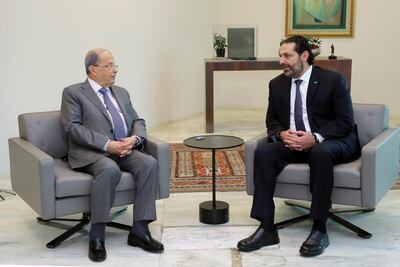Lebanese students have walked out of classes to join protesters all over the country for the past two days, staging sit-ins and marches against corruption and leadership.
They have urged leaders to quickly form a new government of technocrats as Lebanon teeters on the verge of bankruptcy.
President Michel Aoun has yet to set a date for parliamentary consultations to nominate a new prime minister-designate since Saad Hariri resigned on October 29 after nearly two weeks of nationwide anti-government demonstrations.
Students protested throughout Lebanon on Thursday carrying placards demanding that politicians speed up the formation of a new government, the state-run National News Agency reported.
The have called for corrupt officials to be held to account.
In some cases, the army blocked students from protesting while in others, local authorities co-operated.
In Batroun, a coastal city north of Beirut, the mayor temporarily gave students access to the inner courtyard of the town hall, where he gave a speech in support of their demands.

On Wednesday evening, thousands of women took part in protests in Beirut, carrying candles as they marched downtown, while others banged pots and pans in front of Parliament.
Protesters also gathered in front of public institutions they considered to be corrupt, such as the state-run utility company Electricite du Liban.
Local media reported that one man was injured in scuffles with the police when they tried to stop protesters from entering a hotel that is being built on Beirut’s only public beach.
Meanwhile, the Lebanese judiciary started action on high-profile corruption cases.
A financial prosecutor took steps against the director of Lebanese Customs, Badri Daher, for squandering public funds.
The prosecutor also questioned former prime minister Fouad Siniora for about three hours over $11 billion (Dh40.4bn) spent when he was in office between 2006 and 2008.
Caretaker Justice Minister Albert Serhan told The Daily Star that street pressure was the reason many of these years-old cases were suddenly going ahead.
Demonstrations against specific institutions are a shift in strategy as protesters came under fire for blocking motorways.
“On the long term, blocking roads was not a good idea because it made people very irritable as they could not function normally,” said Michael Young, editor of Carnegie's Middle East Diwan blog.
"This shows a certain amount of flexibility and imagination when it comes to dealing with the authorities, while the political class is stuck in a daze and does not know how to act.
Mr Aoun “continued his contacts to determine the date of parliamentary consultations to nominate a new prime minister” before meeting Mr Hariri in the afternoon, NNA reported on Thursday.

The delay has been caused by the insistence of the president’s son-in-law and caretaker Foreign Minister, Gebran Bassil, to be included in the new government despite his unpopularity with protesters.
Mr Bassil has said that if he were removed, Mr Hariri, who is widely expected to lead the new government, should also go.
The delay in starting parliamentary consultations is “outrageously long considering the ongoing crisis", Mr Young said.
“There is no good solution but they cannot let this linger forever.”
On Wednesday, the World Bank called for a new Cabinet to be formed quickly and said it expected the effects of a recession in 2019 to be even more significant than an earlier projection of a 0.2 per cent contraction.
Lebanese banks, which have limited access to US dollars for several months, reopened on November 1 after protests prompted them to close.
Cash withdrawals remain capped and clients must pay a small fee, depending on the bank, to take out US dollars.
The Lebanese pounds and American dollar are used interchangeably in Lebanon.
The nationwide shortage of dollars has severely affected businesses, which have tried to force clients to pay in dollars.
But the Economy Ministry issued a circular on Thursday warning them that they could be prosecuted for failing to use only the local currency for trade.
It remains unclear how long Lebanon will remain without a government.
As power-sharing is divided among the country’s 18 sects and governments must include representatives of major religious groups, political bickering and power vacuums are common.
Despite the constitutional practices in place since the end of the civil war in 1990, whereby by the president begins parliamentary consultations as soon as the government resigns, the constitution does not give a time limit for him to do so, said Sami Nader, director of the Levant Institute for Strategic Affairs in Lebanon.
“What politicians are trying to do is to come up with a settlement before the parliamentary consultations take place," Mr Nader said.
"Unfortunately, this is how it works in Lebanon. Institutions such as Parliament are just a cover to deals made outside between big players.”












